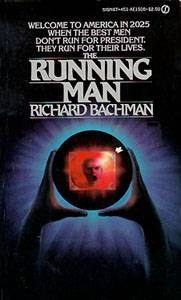
In preparing to write a review of this book, I went and read some other reviews online. While all of the reviewers commented on the dystopian aspect–the violent capitalism that has overtaken the country by the year 2025–none mentioned what I find to be the most important aspect of the story. The Games Company which now runs the country is also poisoning it. All houses are required to have a “free vee” — a television set that carries the free programming — and the company uses it as a diversion to keep the people distracted from the fact that children are dying of lung cancer and pneumonia. The rich population have nose filters to protect themselves from the pollution but the poor are left without.
But I’m getting ahead of myself. The novel is The Running Man, by Richard Bachman. Richard Bachman is a pseudonym that Stephen King used to put out novels he couldn’t publish under his own name. The novel was published in 1982. It becomes obvious that the novel was written before the advent of the internet and/or cell phones when the character has to beg for a couple of new quarters to use a pay phone.
Apparently they made a film of the same title that was only loosely based on the novel. It starred Arnold Schwarzenegger and came out in 1987. I have yet to see the film but I admit my curiosity is piqued. (He did, after all, sign my college diploma. But that’s not quite on topic.)
The story of the novel is as follows: In a dystopian future in the United States of America, the year is 2025. A man named Ben Richards is trying his best to provide for his young family, though he has been out of work for a long time. His wife has turned to prostitution in order to provide food for their family, and medicine for their 18-month-old daughter, who has a severe flu. As the story progresses, we find out she may be dying of pneumonia. Richards turns to the only way to make a profit for his family that he knows of: The Games.
The Games Company produces violent programming for the free vee–things like Swimming With Crocodiles, and a program where contestants with heart conditions and lung conditions run on a treadmill, answering questions until they have a heart attack, stroke, or die. On air. These programs are populated by poor applicants who are desperate to provide for their families by putting their own lives on the line.
The morally corrupt Society of the dystopian future eat these games up as their main form of entertainment. It’s practically impossible to get a library card anymore, only the rich have them, and the television sets are compulsory. (Perhaps this is a commentary on the author’s fears of what might happen to the population of the United States if we stop reading.)
The most popular game on the free vee is called The Running Man. It involves a man running away from hired Hunters who are out to kill him. The Man’s family inherits his winnings after he dies, the amount depending on how many hours he has been able to run from the hunters. If he lives 30 days he is promised 1 billion dollars, and his freedom. But, no contestant has ever made it that far.
After the audition process, our main character, Richards, finds himself on The Running Man. He runs for his life from those who are out to kill him, but eventually manages to turn the tables (as so often these protagonists do).
The countdown format of the titles of the chapters really made it a page-turner. The reader knows that the chapters are counting down to something, but the ride distracts us from wondering too much what we’re counting down to.
I very much enjoyed the setting, the story, and the plot. For the most part I felt that deep-chest suspense that I have come to relate to Stephen King’s written word. There was also an energy involved with reading about the Running Man Game that I would relate to Suzanne Collins’ The Hunger Games. The dystopian future had a science fiction feel to it, more like a Philip K. Dick story than the speculative fiction dystopian future of Panem.
The ending was all King. I spent most of the novel so involved in the story it felt more like I was reading a science fiction or speculative fiction novel than a horror story, the likes of which Stephen King is famous for. When I was in the final chapter, I was reminded the power of Stephen King’s graphic descriptions, the wince-inducing situation that honestly made me a little queasy. It was a very satisfying way to end the plot, though.
I found it to be a fascinating read, and I think others will, too. I feel like we can all relate to Richards as a character. Humans have a deep need to protect and provide for their families. All Richards wanted to do was keep his pride in the process. At the same time, I think there are others who would be more than willing to give up their pride in order to provide for their family.
Stephen King penned a related novel called The Long Walk, and I’m looking forward to reading that one, too. 🙂
